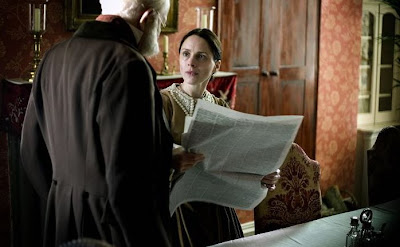
It was H W Longfellow, in his poem 'Santa Filomena', who coined the phrase by which she would be known and remembered by the world...
Whene'er a noble deed is wrought,"I doubt if our Florence has ever flitted in her life!" says her mother in Florence Nightingale, a film drama about her life to be screened on BBC One this evening (Sunday) at 7:00 pm, and - as this line suggests - it's a play that offers a human perspective on Nightingale rather than the saintly figure of legend.
Whene'er is spoken a noble thought,
Our hearts, in glad surprise,
To higher levels rise.
Thus thought I, as by night I read
Of the great army of the dead,
The trenches cold and damp,
The starved and frozen camp,--
The wounded from the battle-plain,
In dreary hospitals of pain,
The cheerless corridors,
The cold and stony floors.
Lo! in that house of misery
A lady with a lamp I see
Pass through the glimmering gloom,
And flit from room to room.
Written and directed by Norman Stone, it features a compelling performance from Laura Fraser as Florence - or 'Flo' as she is endearingly known to her family - who, as part of a challenging dramatic structure, repeatedly addresses her thoughts and feelings directly to viewer, and, in so doing, reveals her courageous - often willful - determination as well as her fears and frailties.
The portrait of Nightingale that emerges from this film is of a driven woman: debating questions of faith with her loving but puzzled father (superbly played by Michael Pennington); confronting Queen Victoria over the teacups at Balmoral; battling with Lord Palmerston in Westminster; or crossing swords with the bigoted, blinkered field doctors in Crimea. She pursues her belief in the call of God whilst, in turn, being pursued by doubts and uncertainties, wracked by guilt over her supposed failures that is - in it's self-hounding relentlessness - a sign of humility tinged with pride.

The story is punctuated - and accelerated - by inter-cut visits to the music hall, where the brilliant Mr Roy Hudd performs patriotic songs in the style of the period with a vim and vigour that recalls the knowing innocence of The Good Old Days and the tragic cynicism of Oh, What A Lovely War. In one of many powerful moments, a knockabout number featuring a chorus line of Light Brigade troops on hobby horses is suddenly devastated by an erruption of canon-fire: stage and battlefield merging into a blur of carnage.
There's a current trend in drama documentaries - typified by recent plays about Tony Hancock, Frankie Howard, Hughie Green and, most recently, Mary Whitehouse - that can best be described as superficial and soap-operaesque. Refreshing then to view Norman Stone's literate, passionate portrayal of a complex character, directed with an unerring eye and ear for period and uncompromising visual flair.
As a result, Florence Nightingale emerges as considerably more real than the mythic character described by Mr Longfellow...
A Lady with a Lamp shall stand
In the great history of the land,
A noble type of good,
Heroic womanhood.
3 comments:
Thanks for shedding some light on the forthcoming drama, particularly pointing out that Stone has managed to ward off attempts to make it soap-operaesque and thus stitch up the audience.
I like the idea of addressing the audience directly - it worked well in 'The Libertine' making each of the characters much more real and helping the audience to identify with them. I like the music hall concept to - although if it seems too much a copy of 'O What a Lovely War' I might have more reservations.My one worry with these things is that they seek so desperately to get away from the accepted image of their subject that they can end up like Eastenders in tights - a modern day dialogue script with all unwitting references to the time of filming and its clever allusions to the present day. If you set out to make a documentary of this time, then a correct representation of the type of character and narrative used is all important - even if that means accepting that under the florid praise of the poet were virtues above the norm.Merely destroying a rather obvious,unsophisticated myth is not good drama on its own.
See what you think when it's broadcast.
Post a Comment